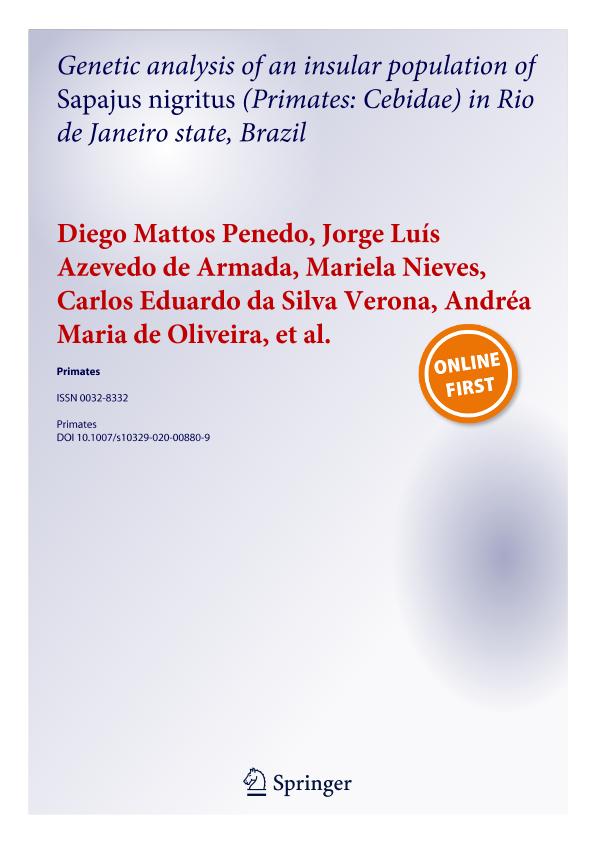Mostrar el registro sencillo del ítem
dc.contributor.author
Mattos Penedo, Diego
dc.contributor.author
Azevedo de Armada, Jorge Luís
dc.contributor.author
Nieves, Mariela

dc.contributor.author
da Silva Verona, Carlos Eduardo
dc.contributor.author
de Oliveira, Andréa Maria
dc.contributor.author
de Sousa dos Santo, Emidio José
dc.contributor.author
Monnerat Nogueira, Denise
dc.date.available
2023-01-09T15:34:23Z
dc.date.issued
2021-03
dc.identifier.citation
Mattos Penedo, Diego; Azevedo de Armada, Jorge Luís; Nieves, Mariela; da Silva Verona, Carlos Eduardo; de Oliveira, Andréa Maria; et al.; Genetic analysis of an insular population of Sapajus nigritus (Primates: Cebidae) in Rio de Janeiro state, Brazil; Springer Tokyo; Primates; 62; 2; 3-2021; 395-406
dc.identifier.issn
0032-8332
dc.identifier.uri
http://hdl.handle.net/11336/183941
dc.description.abstract
The black-horned capuchin (Sapajus nigritus) is a neotropical primate with wide distribution from southeastern Brazil to northeastern Argentina. Although this species has been described with coat pattern variation, even with intrapopulational differences, and characterized as having the greatest genetic diversity among Sapajus species, there are still few studies on natural populations that contribute to the knowledge of this intraspecific variability. We examined individuals from an as yet unstudied population of Ilha da Marambaia, Rio de Janeiro (RJ) state, Brazil, compared with published data for S. nigritus. We sought to confirm the species through phenotypic and genetic characterization using C-banding and fluorescence in situ hybridization with #11qHe+/21WCP probes for chromosomal constitutive heterochromatin (He+) patterns, and cytochrome c oxidase I and II gene sequences for phylogenetic analysis. The coat presented two color patterns, varying from brown to blackish on the body, yellow to brown on the chest, and white to yellow on the face, besides the presence and shape of the tufts on the head, corresponding to S. nigritus. He+ was identified in pairs 4, 12, 13 and 17, and less consistently in pairs 6, 19 and 21, already described for this species. While most Sapajus species have a large He+ block, here pair 11 was identified without extracentromeric He+, the same as reported for S. nigritus from Argentina. Molecular analysis showed divergence of this population from other S. nigritus sequences, reinforcing a trend already demonstrated when samples from RJ are compared with the rest of the distribution, which may represent an evolutionary deviation.
dc.format
application/pdf
dc.language.iso
eng
dc.publisher
Springer Tokyo

dc.rights
info:eu-repo/semantics/openAccess
dc.rights.uri
https://creativecommons.org/licenses/by-nc-sa/2.5/ar/
dc.subject
C-BANDING
dc.subject
CAPUCHIN MONKEYS
dc.subject
CYTOCHROME C OXIDASE I AND II
dc.subject
DNA SEQUENCING
dc.subject
FLUORESCENCE IN SITU HYBRIDIZATION
dc.subject
ILHA DA MARAMBAIA
dc.subject.classification
Biología

dc.subject.classification
Ciencias Biológicas

dc.subject.classification
CIENCIAS NATURALES Y EXACTAS

dc.title
Genetic analysis of an insular population of Sapajus nigritus (Primates: Cebidae) in Rio de Janeiro state, Brazil
dc.type
info:eu-repo/semantics/article
dc.type
info:ar-repo/semantics/artículo
dc.type
info:eu-repo/semantics/publishedVersion
dc.date.updated
2022-09-07T13:28:39Z
dc.journal.volume
62
dc.journal.number
2
dc.journal.pagination
395-406
dc.journal.pais
Japón

dc.journal.ciudad
Tokyo
dc.description.fil
Fil: Mattos Penedo, Diego. Universidade Federal Rural do Rio de Janeiro; Brasil
dc.description.fil
Fil: Azevedo de Armada, Jorge Luís. Universidade Federal Rural do Rio de Janeiro; Brasil
dc.description.fil
Fil: Nieves, Mariela. Consejo Nacional de Investigaciones Científicas y Técnicas. Oficina de Coordinación Administrativa Parque Centenario. CEMIC-CONICET. Centro de Educaciones Médicas e Investigaciones Clínicas "Norberto Quirno". CEMIC-CONICET; Argentina
dc.description.fil
Fil: da Silva Verona, Carlos Eduardo. No especifíca;
dc.description.fil
Fil: de Oliveira, Andréa Maria. Universidade Do Estado de Rio Do Janeiro. Instituto de Biologia "roberto Alcantara Gomes".; Brasil
dc.description.fil
Fil: de Sousa dos Santo, Emidio José. Universidade Federal do Rio de Janeiro; Brasil
dc.description.fil
Fil: Monnerat Nogueira, Denise. Universidade Federal Rural do Rio de Janeiro; Brasil
dc.journal.title
Primates

dc.relation.alternativeid
info:eu-repo/semantics/altIdentifier/doi/http://dx.doi.org/10.1007/s10329-020-00880-9
Archivos asociados
